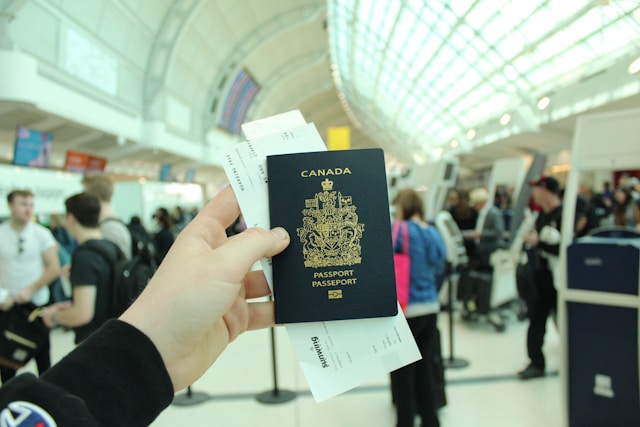Canada is one of the world’s leading economies, known for its stable financial system, robust infrastructure, and open markets. Its welcoming approach to international trade and entrepreneurship has positioned it as a top destination for ambitious businesspeople from around the globe. With a high standard of living, skilled workforce, and access to major international markets, Canada offers fertile ground for businesses of all sizes and industries to thrive.
🌍How ready are you?
For entrepreneurs and investors seeking new opportunities, Canada presents a unique combination of innovation, security, and growth potential. Whether you are aiming to launch a start-up, expand an existing enterprise, or invest in emerging sectors, the Canadian business environment is designed to support and encourage success. From technology and finance to agriculture and clean energy, there is a wide range of sectors actively seeking investment and new ideas.
However, entering Canada’s business ecosystem requires following the right legal pathways, beginning with obtaining the appropriate visa. The Canada Business Visa is specifically designed to attract experienced entrepreneurs, self-employed individuals, and business investors who can contribute to the country’s economic development. Having the correct visa is not only a legal requirement but also an essential foundation for building a credible and sustainable presence in the Canadian market.
This comprehensive guide will walk you through everything you need to know about securing a Canada Business Visa. From eligibility criteria and required documentation to the application process and common pitfalls to avoid, each section has been carefully crafted to provide a step-by-step roadmap. Whether you are just beginning to explore the idea or are ready to start your application, this guide will equip you with the knowledge and confidence to move forward successfully.
Types of Canada Business Visas
Canada offers multiple pathways for entrepreneurs, investors, and business visitors, depending on their goals, business plans, and length of stay. Each visa category is designed to cater to specific types of business activities, and understanding the differences is crucial to choosing the right path.
1. Business Visitor Visa
The Business Visitor Visa is intended for individuals who want to visit Canada temporarily for business-related activities without directly entering the Canadian labor market. Typical activities allowed under this visa include attending business meetings, industry conferences, workshops, trade fairs, or negotiating contracts with Canadian companies. It is important to note that under a Business Visitor Visa, you are not permitted to engage in actual employment or directly provide services to Canadian clients. Stays are usually limited to a few weeks to a few months, and applicants must demonstrate that they have strong ties to their home country and will leave Canada at the end of their visit.
2. Start-Up Visa Program
The Start-Up Visa Program is a permanent residency pathway aimed at innovative entrepreneurs who can build businesses that are competitive on a global scale and create jobs for Canadians. To qualify, applicants must secure a Letter of Support from a designated organization, such as an angel investor group, venture capital fund, or business incubator approved by the Canadian government. Applicants must also meet language requirements in either English or French and have sufficient settlement funds. The Start-Up Visa is particularly attractive because it does not require the business to succeed for the applicant to maintain their permanent residency status. It encourages innovation in sectors such as technology, health, clean energy, and digital industries.
3. Self-Employed Persons Program
The Self-Employed Persons Program targets individuals with relevant experience in cultural activities, athletics, or farm management who are willing and able to make a significant contribution to Canadian cultural, athletic, or agricultural life. Applicants must demonstrate at least two years of experience in their field and show that they can become self-employed once in Canada. Examples of eligible occupations include artists, musicians, athletes, freelance journalists, and farmers. Unlike other business immigration streams, there is no need for a designated organization’s support or a minimum investment amount, but applicants must meet selection criteria related to experience, education, age, language proficiency, and adaptability.
4. Provincial Nominee Program for Business (PNP)
Several Canadian provinces and territories operate their own entrepreneur and investor immigration streams through the Provincial Nominee Program (PNP). These streams are tailored to attract business people who can invest in a business or start a new one within a particular province. Requirements vary significantly by province but typically include a minimum investment amount, active day-to-day management of the business, and job creation for Canadians. Some popular PNP business streams include British Columbia’s Entrepreneur Immigration Stream, Alberta’s Foreign Graduate Start-Up Visa Stream, and Ontario’s Entrepreneur Stream. In most cases, successful applicants first receive a work permit and, upon meeting business performance milestones, can apply for permanent residency.
Requirements for Canada Business Visa
| Requirement | Details |
|---|---|
| Valid Passport | Must be valid for the duration of stay in Canada |
| Proof of Business Ownership or Experience | Documents showing ownership, experience, and financial stability |
| Letter of Support | From a designated organization (for Startup Visa applicants) |
| Business Plan | Detailed and viable plan outlining business goals and strategies |
| Proof of Funds | Evidence that you can financially support yourself and your business |
| Police Certificates | From all countries you have lived in for more than 6 months |
| Medical Examination | Required if staying longer than six months or from certain countries |
| Biometrics | Photograph and fingerprints |
| Application Forms | Completed and signed |
Step-by-Step Process to Get a Canada Business Visa
Step 1: Determine the Right Visa Type
Understand your business goals and choose the most appropriate visa pathway.
Step 2: Gather Required Documents
Prepare your passport, business documents, proof of funds, police certificates, and other necessary documents.
Step 3: Create a Business Plan
Draft a detailed business plan that shows viability, profitability, and job creation potential.
Step 4: Secure Support from a Designated Organization (for Startup Visa)
Approach venture capital funds, angel investors, or business incubators designated by the Canadian government.
Step 5: Complete the Application Forms
Fill out the relevant forms for your chosen visa type.
Step 6: Pay Fees
Submit your payment for application fees and biometrics.
Step 7: Submit Biometrics and Attend Interview (if Required)
Book an appointment at your nearest Visa Application Center.
Step 8: Medical Examination
Schedule your medical examination with an approved panel physician.
Step 9: Wait for Decision
Processing times vary but generally range between 12 weeks to 16 months depending on the visa stream.
Step 10: Prepare for Arrival in Canada
Upon approval, plan your relocation and understand the conditions attached to your visa.
Canada Business Visa Costs
| Item | Cost (CAD) |
| Business Visitor Visa Fee | $100 |
| Startup Visa Program Fee | $2,140 |
| Biometrics Fee | $85 |
| Medical Examination (estimated) | $200 – $300 |
| Police Certificate (varies by country) | $20 – $100 |
| Translation of Documents (if needed) | Varies |
*Note: Costs can vary depending on country and service providers.
Common Mistakes to Avoid
- Submitting incomplete forms: Missing even a single document can lead to delays or rejections.
- Weak business plan: Without a compelling and realistic business plan, approval chances drop significantly.
- Not showing enough funds: Proof of financial capacity is critical.
- Ignoring language requirements: Some programs mandate IELTS or TEF results.
- Failure to research designated organizations: Especially crucial for Start-Up Visa applicants.
Canada Business Visa Eligibility
| Criteria | Details |
| Age | No specific age limit, but usually between 22 – 55 years |
| Language Proficiency | English or French (proof required for Startup Visa) |
| Business Experience | 1-2 years minimum ownership or senior management experience |
| Financial Stability | Must have sufficient funds to support self and business |
| Clean Criminal Record | Mandatory police clearance certificates |
| Health | Must pass a medical examination |
| Business Viability | Strong business plan or support from a designated organization |
Top Provinces for Business Immigration
Ontario
Ontario is often considered the economic engine of Canada, and Toronto — its capital city — is widely recognized as the country’s financial and business hub. With a strong and diversified economy covering sectors like finance, technology, education, healthcare, and real estate, Ontario provides unparalleled opportunities for business immigrants. The Ontario Immigrant Nominee Program (OINP) offers specific streams targeting entrepreneurs and corporate investors looking to establish or buy businesses within the province. Ontario’s large population, multicultural communities, excellent infrastructure, and global connectivity make it a prime destination for international business owners aiming to access both North American and global markets.
British Columbia
British Columbia (BC) boasts a vibrant and rapidly growing economy driven by technology, clean energy, tourism, film production, and international trade. Vancouver, its largest city, is particularly attractive to tech startups, green technology innovators, and sustainable businesses. BC offers the British Columbia Provincial Nominee Program (BC PNP) Entrepreneur Immigration stream, which is tailored to entrepreneurs and investors willing to establish innovative businesses. Its strategic location on the Pacific Rim also provides businesses direct access to Asian markets, making BC an ideal destination for entrepreneurs seeking global reach while enjoying a high quality of life.
Quebec
Quebec stands out due to its distinct culture, French-speaking majority, and unique business immigration programs separate from federal pathways. The Quebec Entrepreneur Program and Quebec Investor Program offer attractive options for experienced businesspeople and investors willing to contribute to the province’s economy. Quebec places a strong emphasis on innovative startups, manufacturing, technology, and cultural businesses. Business immigrants to Quebec often benefit from lower costs of living compared to cities like Toronto or Vancouver, combined with access to a highly skilled and bilingual workforce, ideal for businesses targeting both English and French markets globally.
Alberta
Alberta is traditionally known for its rich natural resources, especially in oil and gas, but its economy is becoming increasingly diversified. Today, Alberta also offers robust opportunities in agriculture, technology, tourism, and renewable energy sectors. The Alberta Immigrant Nominee Program (AINP) offers a dedicated Rural Entrepreneur Stream and Foreign Graduate Entrepreneur Stream, which are attractive options for newcomers ready to invest in Alberta\u2019s smaller communities or launch innovative businesses. Alberta’s low corporate tax rates, affordable cost of living, and proactive government support for business innovation make it a compelling choice for entrepreneurs seeking growth opportunities beyond traditional sectors.
Manitoba
Manitoba is an emerging gem for business immigrants looking to tap into diverse startup ecosystems and vibrant small-to-medium enterprise (SME) sectors. The Manitoba Provincial Nominee Program (MPNP) Business Investor Stream targets entrepreneurs who want to establish or purchase businesses outside the capital city, Winnipeg, encouraging economic development across the province. Manitoba offers affordable real estate, lower living costs, and government-backed business support programs, making it attractive for immigrants aiming to make a real impact. Key industries in Manitoba include agribusiness, manufacturing, technology, and transportation, offering a wide range of possibilities for business newcomers.
10 Frequently Asked Questions (FAQs)
1. How long does it take to get a Canada Business Visa?
The processing time for a Canada Business Visa can vary widely depending on the type of visa you are applying for and your country of residence. For a simple Business Visitor Visa, processing might take a few weeks, typically around 2–8 weeks. However, for more complex programs like the Start-Up Visa, it can take up to 12 to 16 months or even longer, depending on the volume of applications and the time needed to secure a Letter of Support from a designated organization. Other factors that can affect processing time include how complete your application is, whether additional documents are requested, and the need for interviews or medical exams.
2. Can I bring my family with me?
Yes, in most cases, you are allowed to bring your immediate family members when you move to Canada on a business visa. This typically includes your spouse or common-law partner and any dependent children under the age of 22. Your spouse may even be eligible to apply for an open work permit, allowing them to work for any employer in Canada, while your children can attend school. It’s important to submit their applications along with yours or soon after to ensure a smooth and timely processing of your family’s documentation.
3. Do I need to invest a specific amount?
The investment amount required depends largely on the business immigration stream you are pursuing. For the Start-Up Visa Program, there is no minimum investment amount required from the applicant personally; however, you must secure a commitment from a designated organization such as a venture capital fund, angel investor group, or business incubator. In contrast, certain Provincial Nominee Programs (PNPs) may require a minimum personal investment, often ranging from CAD 100,000 to CAD 600,000, depending on the province and the nature of the business. Always review the specific requirements of the program you are applying to.
4. Can I apply without speaking English or French?
Language ability is a crucial component for some business immigration streams, especially for the Start-Up Visa, where proof of proficiency in either English or French (through tests like IELTS or TEF) is mandatory. However, if you are applying for a Business Visitor Visa — intended for short-term stays such as attending conferences or meetings — there is no formal language requirement. Nevertheless, having at least a basic command of English or French can significantly improve your ability to conduct business activities and adapt to the Canadian environment.
5. What happens if my business fails?
If you immigrate to Canada under the Start-Up Visa Program and your business does not succeed, it does not affect your permanent resident (PR) status. Canada understands that entrepreneurship involves risk, and business failure is part of that process. As long as you were approved for PR based on the initial application and met all eligibility criteria at the time of granting the visa, your immigration status remains intact. However, if you are applying under a Provincial Nominee Program, it’s crucial to review the specific conditions of your program, as some provinces may require you to meet certain business performance benchmarks.
6. Can I apply for Permanent Residency through business immigration?
Yes, many of Canada’s business immigration pathways are designed to lead to permanent residency. For instance, successful applicants of the Start-Up Visa automatically receive permanent resident status once their application is approved. Many Provincial Nominee Programs for entrepreneurs also offer a pathway to PR, usually contingent on meeting certain conditions such as actively managing a business and achieving outlined investment or employment targets. Obtaining PR allows you and your family to live, work, and study anywhere in Canada, and eventually apply for Canadian citizenship if eligible.
7. Is age a restriction for business visas?
Technically, there is no formal age limit for most Canadian business visas. However, some immigration programs — particularly Provincial Nominee Programs — might give preference to candidates who are within a productive working age range, typically between 22 and 55 years old. Younger applicants may score slightly higher on point-based systems because of their perceived longer-term contribution potential. Nevertheless, strong business experience, a solid business plan, and financial resources can outweigh age in many cases.
8. Can I operate multiple businesses?
Yes, once you are in Canada with a business visa or have obtained permanent resident status, you are generally allowed to own and operate multiple businesses. There are no restrictions preventing you from investing in different ventures or expanding your entrepreneurial activities beyond your initial business plan. However, during the initial immigration period, particularly under Provincial Nominee Programs, you may be required to focus on and maintain the primary business outlined in your visa application until you meet all your program obligations.
9. What industries are most favored?
Certain industries in Canada are particularly attractive for business immigrants due to government incentives, market demand, and growth potential. These include technology (especially AI, biotech, and fintech), renewable and green energy, agri-food production and innovation, healthcare and medical technologies, and advanced manufacturing. If your business or investment aligns with these high-priority sectors, it may enhance your application’s competitiveness, especially under economic immigration streams or startup-related programs.
10. Can I buy an existing business in Canada?
Yes, buying an existing business is a popular option for many business immigrants. Some Provincial Nominee Programs even favor or require purchasing an existing business instead of starting a new one from scratch. This route is often less risky because the business already has established operations, customer bases, and revenue streams. Before proceeding, it’s advisable to conduct proper due diligence, verify financial records, and understand the market conditions. Immigration officers will often review whether the business is viable and beneficial to the Canadian economy as part of your application.
Conclusion
Canada’s business immigration programs offer fantastic opportunities for entrepreneurs, investors, and business visitors alike. By carefully choosing the right visa stream, preparing strong documentation, demonstrating your business skills, and showing financial stability, you can achieve your dream of living and doing business in Canada.
Success starts with thorough preparation. Invest time in planning your strategy, understanding the visa pathways, and consulting professionals if needed. With Canada’s open economic policies, supportive government programs, and diverse market, it remains one of the best countries globally to invest, innovate, and grow your future.
If you’re ready to take the leap, start your application journey today. Canada awaits your business brilliance!






